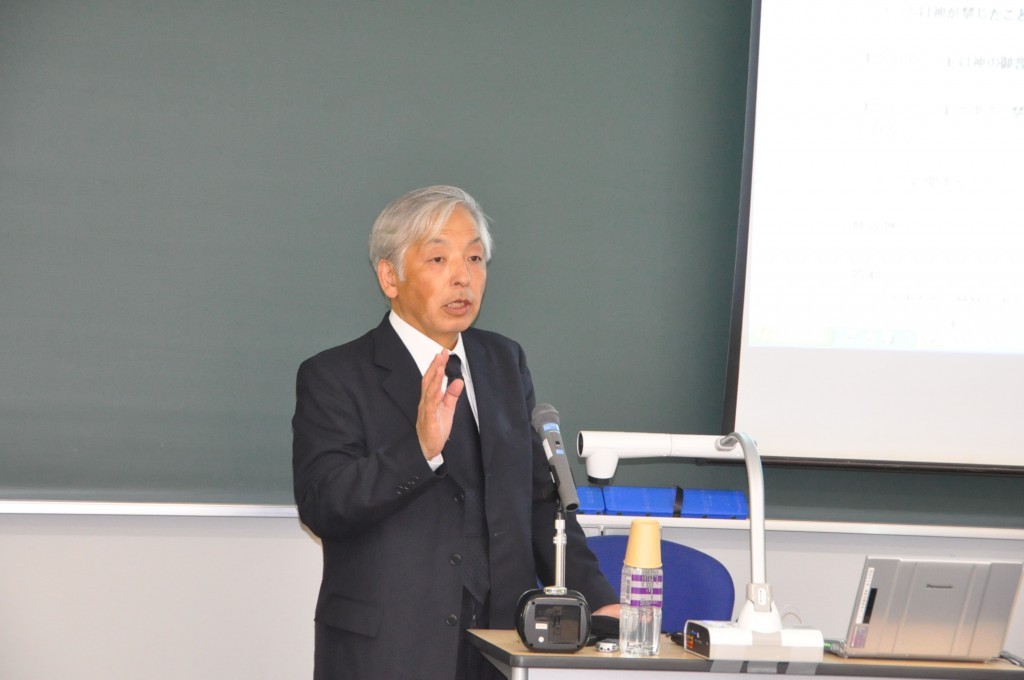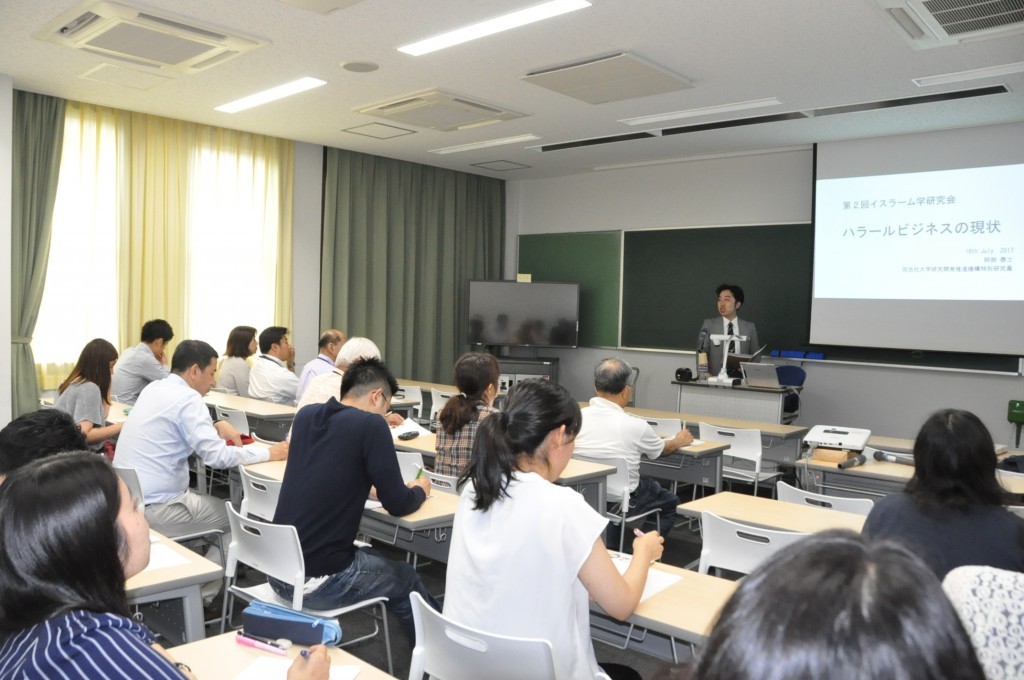Center for Interdisciplinary Study of Monotheistic Religions(CISMOR)Doshisha University
> Public Lectures > 【For Students and Academics】Halal and Halam/The Present State of Halal BusinessPublic Lectures
The 2nd Sharia Studies
【For Students and Academics】Halal and Halam/The Present State of Halal Business
| Date: |
2017/07/18 15:00-16:30 |
|---|---|
| Place: | Room 31, Shingakukan, Imadegawa Campus, Doshisha University |
| Lecture: |
Junya Shinohe ( Professor of School of Theology / Director of CISMOR , Doshisha University) Taiji Abe ( Research Fellow of CISMOR, Doshisha University) |
| Summary: | |
|
Professor Shinohe first noted that halal (permissible) means “what God did not prohibit” and halam (forbidden) means “what God prohibited”. The general structure is that the rule of halam sits within the principle of halal. Both halal and halam are based on the Qur’an. If you search for the usage of the term ‘halal’ in the Qur’an it refers to sanctuaries such as the Kaaba shrine in Mecca, or to provisions relating to eating and drinking such as the prohibitions on eating pork or drinking alcohol, or to stipulations governing making interest from loans or behavior during sacred months, or to ceremonial rules such as those for sacrifices, but the common thread is that these rules must not be broken. Although the terms halal and halam are obviously mentioned in the Qur’an, their practical applications are not always clear and their interpretation has traditionally been the role of jurists. In modern times the concepts of halal and halam have become widely known amongst ordinary Muslims as a result of the publication of The Lawful and the Prohibited in Islam (al-Halal wal-haram fil Islam) (Egypt, 1960) by Yusuf al-Qaradawi. According to the first edition, the book was written at the request of Al-Azhar University in Egypt in order that non-Muslims could understand the life of ordinary Muslims. It has been very widely read and many similar books have been published. The contents include eleven guidelines, as well as halal and halam in daily life. Although it has become a handbook used for considering whether one’s life is Islamic or not, the book has been criticized because it is contrary to the afore-mentioned Islamic traditions and because ordinary Muslims make their own judgments based on the guidelines it outlines. In Malaysia and Indonesia there are both governmental and private halal certification bodies, which treat Yusuf al-Qaradawi’s book in the same way as [they treat] the Qur’an. Regarding halal authorization, these institutions grant the same power to the book as they do to the Qur’an, and so they have been criticized by Middle Eastern scholars. Under traditional Islamic law judgements regarding specific cases are always required to be based on the Qur’an, but there is concern [on the part of Islamic scholars in the Middle East] that these Indonesian and Malaysian bodies are monopolizing fatwas related to food, drink and other products which are used all over the world. Dr. Abe then gave a presentation. He started by arguing that “making a profit is in itself a form of contribution to society”, and he pointed out the legitimacy of promoting industry. He followed by outlining the beginning and development of halal businesses and the ‘industrialization’ of certification services and related businesses. At this point he gave an example of the support for Japan’s halal businesses, and looked at the halal certification given by charities and other groups in Japan and at some of the problems connected to the halal-related work of national and local government. Dr. Abe pointed out the fact that various conceptions of halal enterprise co-exist, such as those not opposed to religious activities or to the aims of religious organizations (e.g. religious organizations), those without the main aim of spreading religious dogma, carrying out ceremonial functions or indoctrinating believers (e.g. non-profit organizations), or those without any religious significance whose support, promotion, encouragement and interventions have no effect on religion (e.g. national and local authorities). Regarding Inbound Business, as one way of realizing the target figures of the Japanese government’s tourism vision much is expected of halal business, but at the same time Dr. Abe showed that there are many issues regarding its application. As an example of this, in 2014 (Heisei 26 in the Japanese calendar) it was reported that investigations were ongoing into halal initiatives in Kansai-region restaurant enterprises which were part of the cooperative restaurants in universities targeted by the ‘Top Global University Project’. Finally, as an example related to overseas business (‘Outbound Business’ in Japanese English), it was shown how Malaysia is trying to establish a hub institution for halal certification as part of its support for national power, and how the income of the halal business’ target market is rising particularly fast, due to the rate of increase in regional average monthly salaries and to Muslims accounting for more than 60% of these countries’ populations. Furthermore, Dr. Abe pointed out the difficulties of the halal business for the Japanese companies already operating in Malaysia. Translated by Masaki Nagata |
|
| Lecture in Japanese. | |
|
20170718poster |
|

